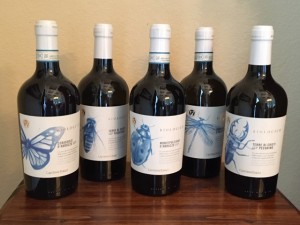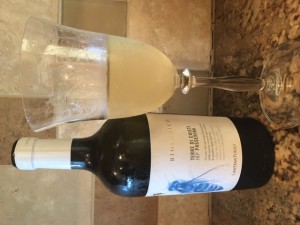A growing number of people all over the world have become interested in the benefits of organic farming and the idea of vegan living. In the wine industry in Italy, more and more wineries are adopting the techniques of organic farming and becoming certified by the EU and other governmental agencies. The addition of vegan production adds another level of differentiation and appeal to the marketplace. One such winery is the Coop Cantina Tollo, located in the town of Tollo in the province of Chieti in the region of Abruzzo.
Established in 1960, the Coop today consists of 700 growers who produce grapes on 2,700 hectares of land in the Adriatic regions of Abruzzo, Molise and Puglia. However, only about 50 of these (for a total of 200 hectars, all in Abruzzo) are certified organic and vegan. Cantina Tollo’s organic vineyards are situated about 5km from the Adriatic and 25km from the mountains, allowing the vines to thrive in the sea breeze while enjoying the cool evenings of the foothills. These conditions are excellent for organic growing.
Though Cantina Tollo’s organic farming began 30 years ago with production in 1990, organic wines have been undergoing vegan certification since 2016. This will be the initial year that the winery produces and sells a line of organic and vegan wines, a further step in the winery’s program for sustainability. Though not available in the USA until probably the autumn of 2020, these wines will continue Cantina Tollo’s philosophy of offering “wines that are reasonably priced with high quality.” The bottle is shaped like the old-style bottles used many years ago by the then farmer/winemakers for their own family production. The labels are made from recycled paper and cotton, and feature drawings of different insects that are found in the vineyards and are thus a part of the production.

Cantina Tollo’s bottles. PHOTO: TERRY DUARTE
Cantina Tollo’s new organic and vegan line will consist initially of five offerings. The white wines are Trebbiano d’Abruzzo, Passerina and Pecorino while the rosé is Cerasuolo d’Abruzzo and the red wine is Montepulciano d’Abruzzo. My friend Irene Graziotto at Studio Cru, the public relations representative for Cantina Tollo, arranged for the winery to send me samples of these wines. As is my custom when tasting wines at home, I did so with meals that my excellent chef wife prepares. Here are the results of the meals/tasting.
We begin with the 2019 Trebbiano d’Abruzzo DOP, an unfiltered 12.5% alcohol wine made from 100% Trebbiano d’Abruzzo grapes. Harvested in the second half of September, the grapes were crushed at low temperature and the lees removed. Fermentation and four months of aging were done in stainless steel tanks at 14-16°C. The result was a wine that was straw yellow in color with a fruity nose. It finished medium and smooth. We drank this with an entrée of cheese ravoli in a Cacio e Pepe sauce. The wine improved as I drank it and I rated this wine an 88/89.

A glass of 2019 Terre Di Chieti Passerina IGP. PHOTO: TERRY DUARTE.
The second wine was a 2019 Terre Di Chieti Passerina IGP, a 100% Passerina grape, 13% alcohol offering. Also harvested in the second half of September, the Passerina grapes were soft pressed and cold decanted. Fermentation and aging of four months were done in stainless steel tanks. The resulting wine was a pale straw yellow color with a light fruit nose. It finished medium, full and smooth with a fruit taste. We served the Passerina with pan-fried sea bass in a lemon butter sauce over homemade tagliatelle. I rated the Passerina a 90.
The last white wine was a 2019 Terre Di Chieti Pecorina IGP, a 100% Pecorino grape 13% alcohol offering. Harvested in the last ten days of September, the Pecorino grapes underwent destemming, cryomaceration, soft pressing, cold decanting and control of the clear must fermentation temperature. Fermentation and aging were accomplished in stainless steel tanks. The Pecorina was a pale yellow color with a light fruit nose. It finished medium, fruity and smooth. Like all the other white wines it showed nice acidity. We drank this wine with an entrée of baked chicken with a sauce of mushrooms and artichokes served over rice. I rated this very nice example of a Pecorino a 91/92.
On a very nice evening we tried the 2019 Cerasuolo D’Abruzzo DOP, a 13.5% alcohol Rosato (rosé) made from 100% Montepulciano grapes. Also harvested in the last ten days of September, the grapes were soft pressed and cold decanted with control clear of the must fermentation temperature. The wine was aged for three months in stainless steel tanks. The Cerasuolo was a dark pink in color with a very light nose. It finished medium but a bit short. We tried this wine with antipasti and I rated it an 88.
The same evening we also tried the 2019 Montepulciano D’Abruzzo DOP, a 100% Montepulciano grape 13% alcohol wine. The grapes were harvested in the middle of October with maceration of skins at controlled temperature. Malolactic fermentation and aging was accomplished in vitrified cement tanks. The Montepulciano was purple in color with a strong fruit and leather nose. It finished long and very smooth. We served this wine with ravioli stuffed with cheese and sausage in a home-made tomato sauce. I liked the Montepulciano a lot and rated this excellent example of the grape a 93.
Cantina Tollo recommends that the white wines be served at 12°C (54°F) and the red at 18°C (66°F). The rosé is recommended to be served at 10°C (50°F). Even if you are not into organic and vegan, these are very nice wines that will be reasonably priced and I recommend that you try them.
My thanks go to Irene Graziotto at Studio Cru and Andrea Di Fabio at Cantina Tollo for allowing us to sample these wines and providing excellent background information for this article. I hope to visit Cantina Tollo when the coronavirus issues are resolved.




